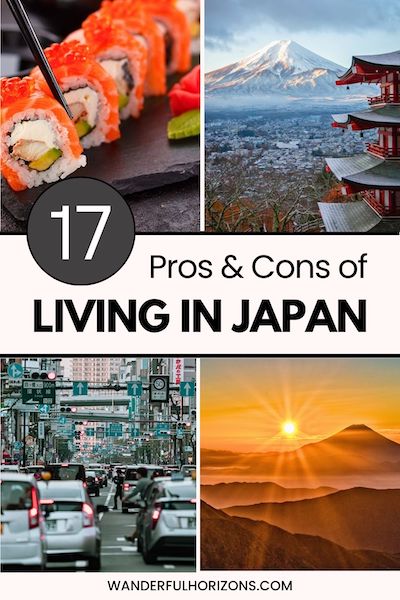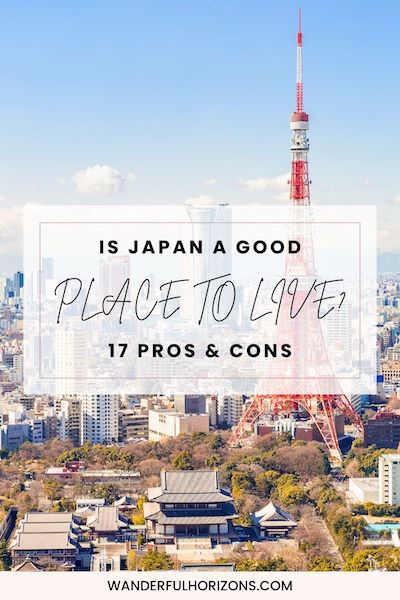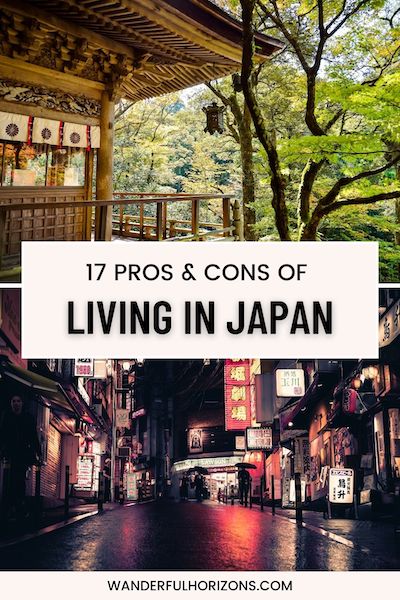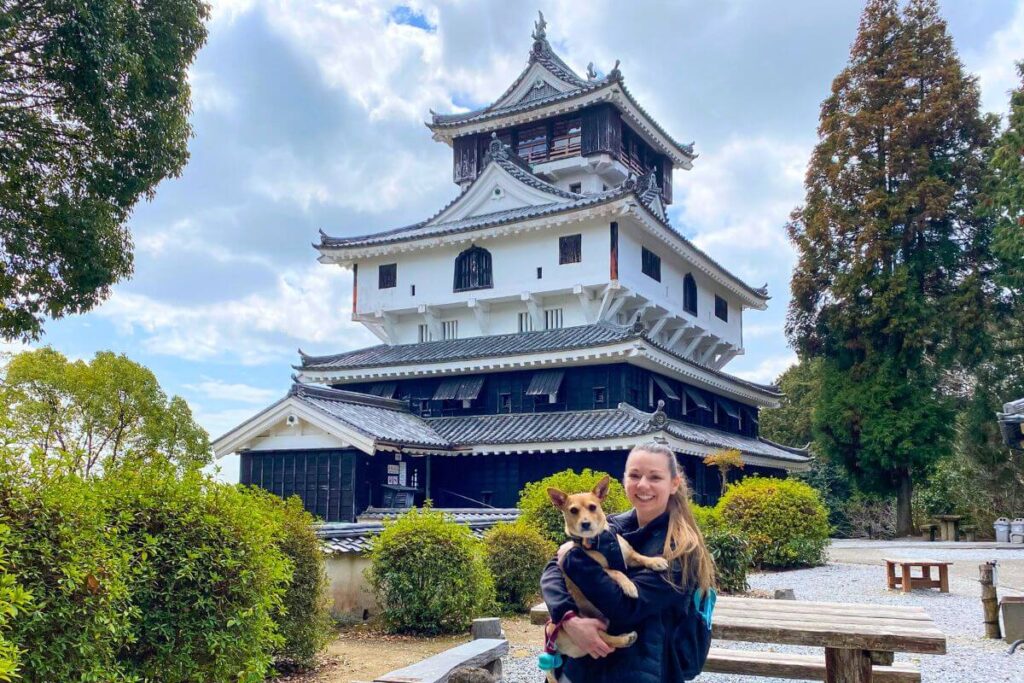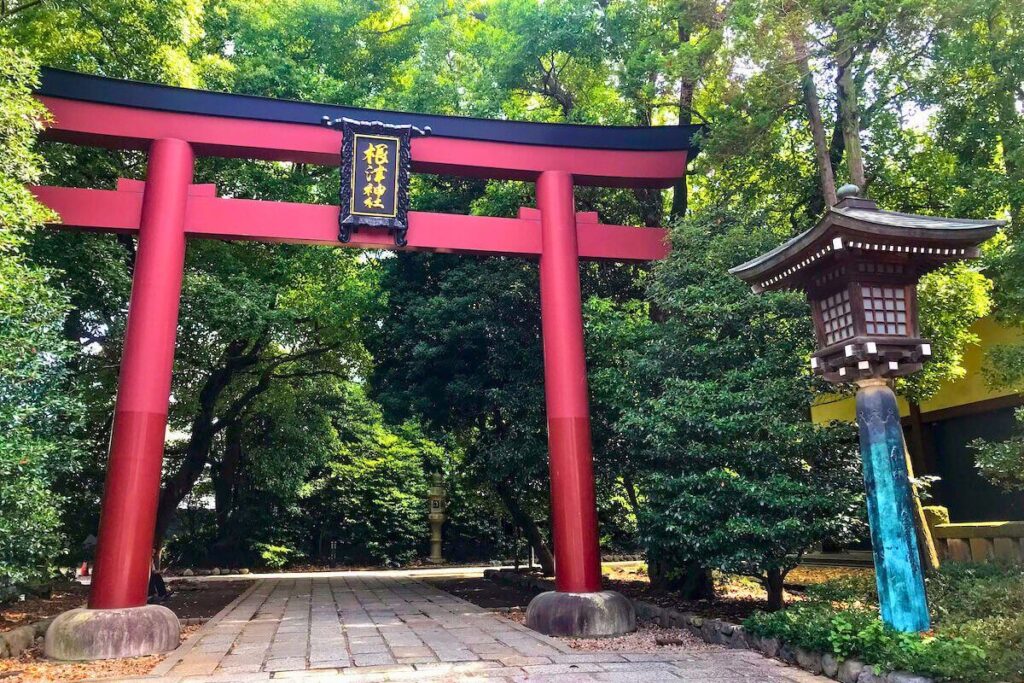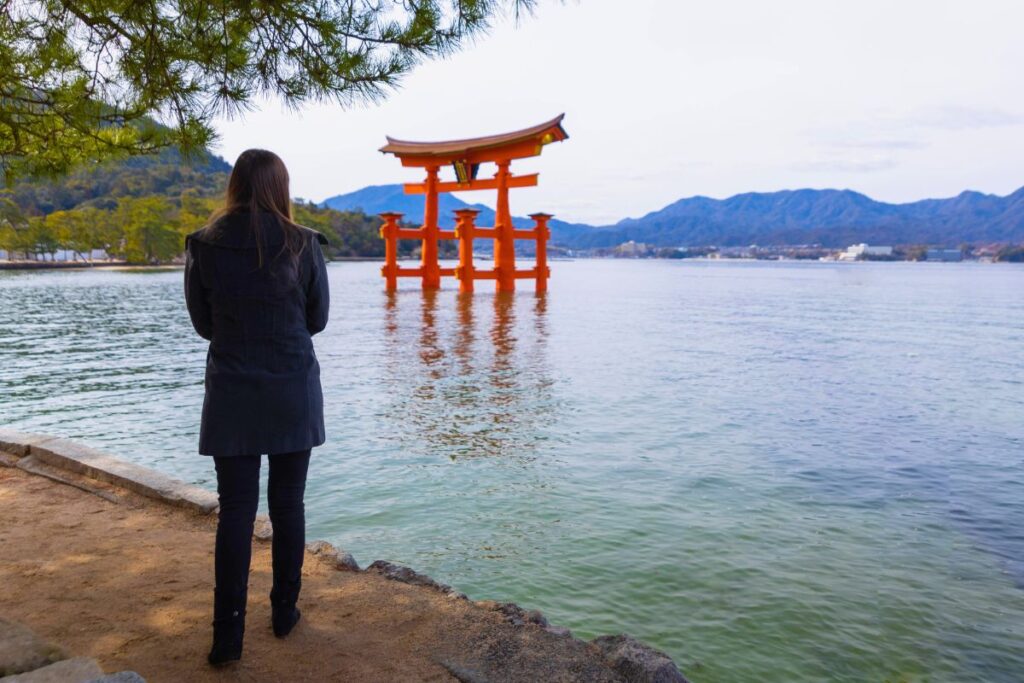
Last updated on September 25, 2023 by Krysti
If you’re considering a move to Japan, then you’ve probably asked yourself the question, “Is Japan a good place to live?”
The answer: it depends on your personal preferences and what you’re looking for in a new home.
While Japan does have a lot to offer – incredible landscapes, vibrant culture, lively food scene, and friendly communities – just to name a few. It also comes with its own unique set of challenges.
I’ve lived here for about a year now and visited several times before I took that leap, so I’ve experienced just about all of it – the good and the bad. While I certainly believe Japan is a great place to live, it’s up to you to decide for yourself what’s best for you.
To help you make this decision, I’ve compiled below the ultimate list detailing the pros and cons of living in Japan.
Pros of Living in Japan
In my opinion, there are so many wonderful perks that come with living in Japan. And while I could talk about them endlessly, I’ve opted to limit myself to those factors that directly impacted my decision to move to Japan.
Efficient Public Transportation

Access to reliable transportation is one of the biggest perks of living in Japan. Photo of bullet train by Rikku Sama via Unsplash.
If there’s only one thing I can say about Japan – it’s that it’s efficient. And this holds true for its public transportation system.
Not only is public transportation in Japan readily available almost everywhere you go, it’s also extremely reliable. From trains to subways, trams, buses, and ferries, everything typically operates on time and as it should.
This means that it is incredibly easy to get around Japan. Whether you’re commuting to work or traveling across the country for vacation, you’ll be able to go where you want, when you want.
And the shinkansen (or bullet trains) are some of the fastest trains in the world, so you’ll have more time to explore and less time spent in transit.
Personal Safety & Security
Japan is one of the safest countries in the world. According to the Global Peace Index, which measures the peacefulness of all countries, Japan is the 9th most peaceful and safest country.
And I can certainly see why. As someone who lives here, I have always felt safe in Japan and have never personally experienced any crime, violence, or harassment.
Generally speaking, I’ve found everyone to be incredibly friendly and helpful. People here look out for each other, and they abide by the law. Crime is just something you do not see – and I consider that to be one of the biggest advantages of living in Japan.
Polite & Friendly Society
Many people believe that Japan is the most polite society in the world – and I have to agree wholeheartedly.
Nearly every interaction and encounter that I’ve had with locals in Japan has been incredibly positive. People here are so polite, friendly, kind, and accommodating. They will literally go out of their way to help you and make sure you’re okay.
This universal sense of hospitality and politeness is an essential and deep-rooted part of Japanese culture. It stems from the practice of omotenashi, which is loosely translated as “Japanese hospitality” or “selfless customer service.”
Everyone in Japan is taught from a very young age the importance of sincere and honest hospitality without the expectation of anything in return. As a result of this, Japanese people go above and beyond to ensure that those around them are welcomed and cared for.
Delectable Japanese Cuisine
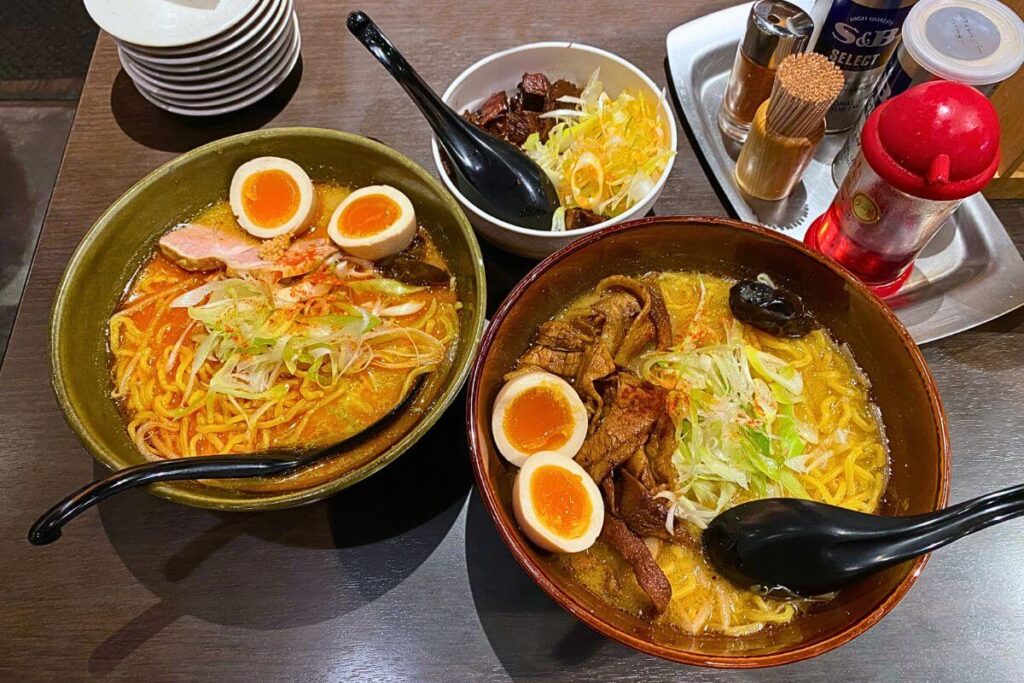
If you’re a foodie, Japan is a great place to live!
Japanese food is incredible! It’s fresh, healthy, delicious, and there are so many options. From ramen to sushi, udon, soba, curry, tempura, yakitori, and miso, you can find it all here and more.
And the best part is – it’s super affordable. Whether you eat out at a local restaurant or grab street food from a vendor, eateries in Japan tend to be cheaper than what you’ll find in many Western countries.
Furthermore, cooking classes are quite common, especially in major cities. So if you prefer to eat at home, you’ll have the opportunity to learn how to cook real, authentic Japanese food from local chefs.
Child-Friendly Environment
I’ve met several foreigners who are raising children in Japan, and they’ve all had nothing but positive things to say about their experiences here.
First of all, because Japan is so safe, there’s a greater sense of ease and security among parents. As a result of this, kids have more freedom and can venture out on their own earlier.
It’s not uncommon in Japan to see elementary kids walking themselves to and from school. Oftentimes you can spot them by the yellow hats they wear. These hats, which signify their young age, are worn so adults within the community can spot them and look out for them.
In addition to this, Japan is home to several child-friendly spaces. In fact, nearly every town and city has a park or multiple parks solely dedicated to the entertainment of children.
And finally, from a more practical standpoint, Japan offers excellent education, low levels of pollution, and is known for its low childhood obesity and mortality rates.
Universal Cleanliness
One of the things that I love most as an expat living in Japan is the level of general cleanliness you’ll find throughout the country.
Whether it’s the subway, a public restroom, or a random street in the middle of the city, everything is clean. There’s hardly any litter or garage, even in more touristy areas.
And, what’s so surprising about all of this is that trash cans are hard to find – like really hard to find. So most people just keep their trash on them and throw it out when they get home.
This may seem like a burden to some, but in Japan, it’s how you show respect to your community and your environment. Cleanliness is an important part of Japanese culture and is something that everyone is expected to contribute to for the betterment of all.
Vibrant Culture
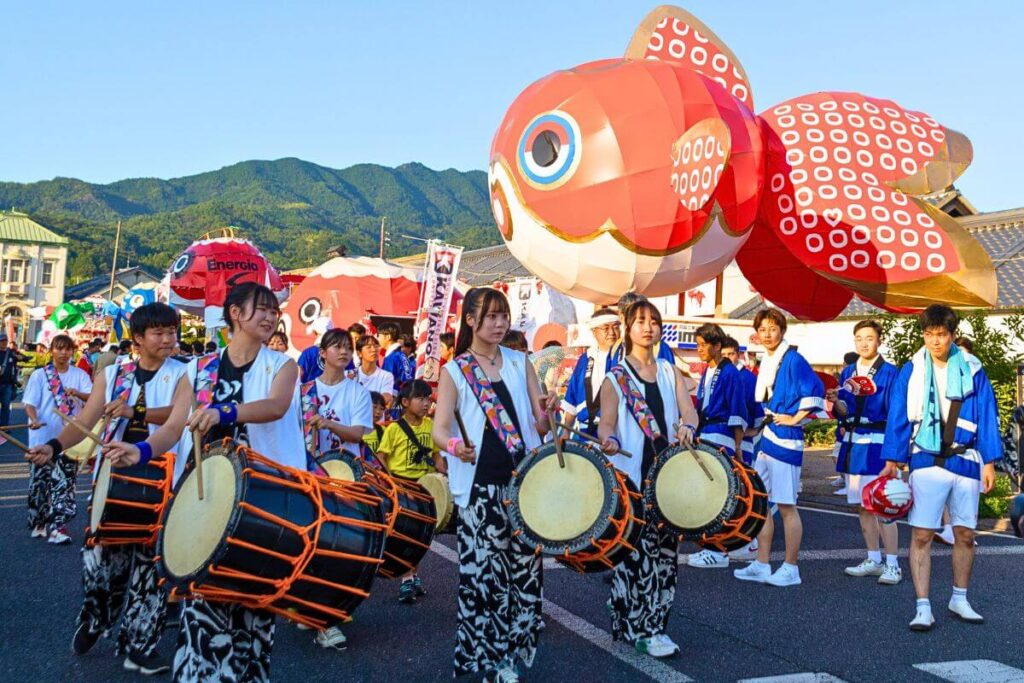
Cultural events, like this Goldfish Lantern Festival, make Japan an exciting place to live!
If you’re interested in cultural experiences, then Japan is a wonderful place for you to live.
The culture here is so vibrant and integrated into society that it can be felt on a day-to-day basis. From the architecture to the food, the decor, the attire, and general social interactions, Japanese culture is present in all aspects of life.
In addition to this, the country hosts a variety of traditional festivals and celebrations, many of which feature dances, performances, parades, and/or religious rituals.
Some of the largest celebrations held in Japan include:
- Gion Matsuri in Kyoto
- Tenjin Matsuri in Osaka
- Nebuta Matsuri in Aomori
- Awa Odori Festival in Tokushima
- Kanda Matsuri in Tokyo
These events, which occur throughout the year, offer the opportunity to witness Japanese culture on full display.
Ample Employment Opportunities
This may come as a surprise, but there are actually quite a few job opportunities for foreigners looking to move to Japan. While expats who speak Japanese will have more options, even those who don’t know the language can usually find a job in an English-focused industry.
One of the most common jobs for Americans living in Japan is teaching English. There are several programs for this throughout the country, but the most prominent and reputable is the Japan Exchange and Teaching Program or JET Program.
Run by the Japanese government, JET places foreign teachers across the country in public and private schools. Common compensation for this program includes a modest salary, accommodations, health insurance, and flight allowance.
Other jobs commonly held by foreigners include those within translation services, international sales and marketing, IT support, engineering, and hospitality.
Affordable Health Care
Japan offers universal health care to all legal residents, even foreigners, as long as they reside in the country for at least three months.
Under this system, the government pays for 70% of all medical costs, while the patient is responsible for paying the remaining 30%. Although this may sound like a lot, it actually isn’t, as healthcare costs in Japan are generally very affordable to begin with.
If someone is elderly or on a low-income budget, they may be able to get as much as 90% of their medical costs covered. Meanwhile, young children typically receive a 100% subsidy for their health care.
In order to receive this benefit, all residents are required to enroll in a public health insurance program. This can be done through your employer or through the government if you’re self-employed or unemployed.
Amazing Natural Scenery
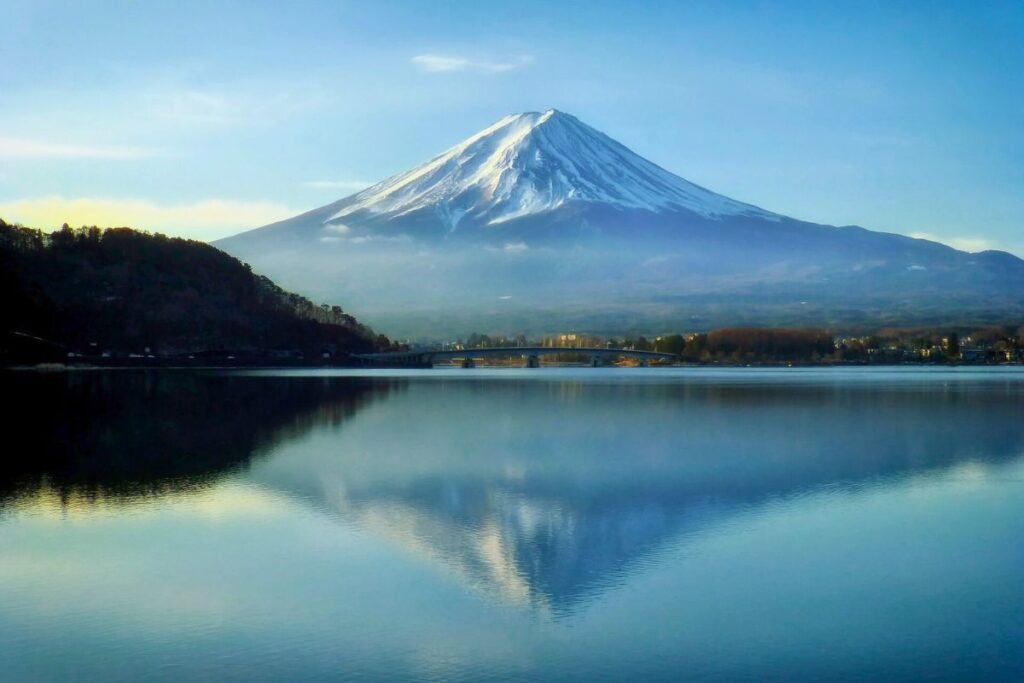
Japan’s spectacular landscape makes it a beautiful place to live. Photo of Mount Fuji by 12019 via Pixabay.
Japan may be a small island nation, but it’s one that offers an abundance of incredible scenery and landscapes. From white sandy beaches to snow-covered mountains, cascading waterfalls, pristine lakes, vibrant forests, and expansive deserts, Japan really has it all, and it’s all beautiful.
While there are countless natural wonders across the country, some of the most prominent include:
- Mount Fuji
- Nachi Falls in Wakayama
- Takachiho Gorge in Miyazaki
- Tottori Sand Dunes
- The Japanese Alps
- Yakushima Island
Of course, we also can’t forget about cherry blossoms season. For two weeks in spring, the entire country is blanketed in vibrant shades of pink and white, creating a landscape that is truly magical.
Abundant Travel Opportunities
One of the biggest pros of living in Japan, in my opinion, is the travel opportunities that exist here.
Of course, there are many places to visit within the country – Japan is home to more than 14,000 islands, after all. However, the country’s location also offers easy access to several other Asian destinations. From South Korea to Taiwan, China, the Philippines, Vietnam, Singapore, and Thailand, the options are endless!
And the best part about it is that flights in this area of the world are very affordable. So it’s super easy to cross numerous destinations off your bucket list.
Cons of Living in Japan
Unfortunately, every county has its downsides. As a foreigner living in Japan, these are some of the challenges you may find yourself faced with.
Frequent Natural Disasters
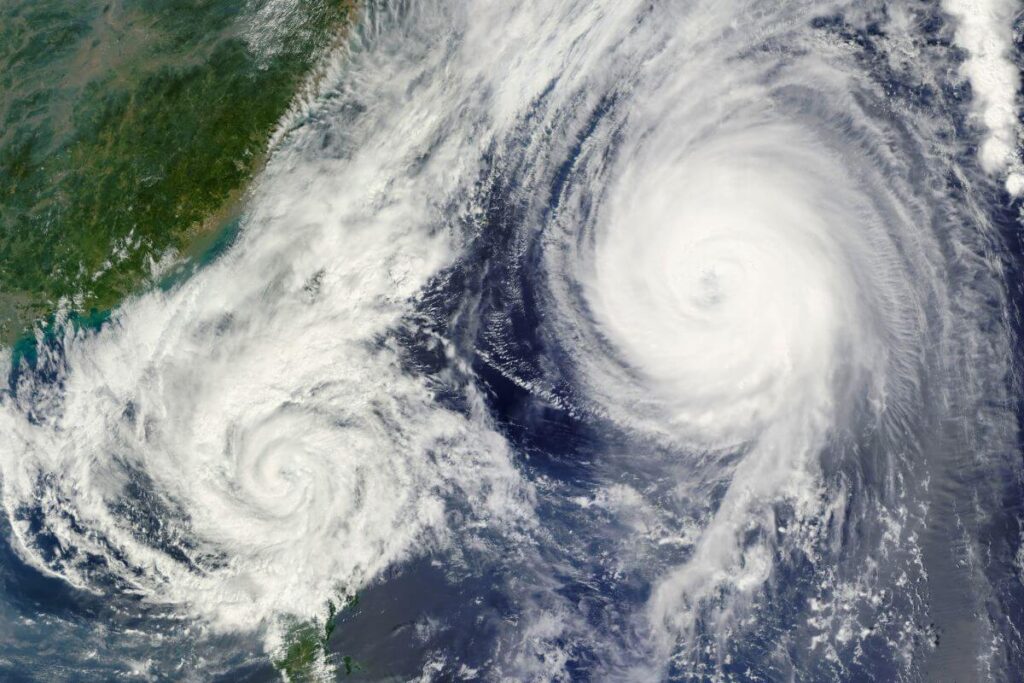
Natural disasters are one of the greatest difficulties that expats face when living in Japan. Photo of typhoon by WikiImages via Pixabay.
One of the biggest disadvantages to living in Japan, and something you’ll have little control over, is the presence of natural disasters.
Japan is located along the Pacific Ring of Fire, which is the most active zone in the world for volcanic and seismic activity. As a result of this, the country has been known to experience earthquakes, tsunamis, and volcanic eruptions. In addition to this, typhoons are common throughout the country and can cause high tides, flooding, and landslides.
Thankfully, Japan is prepared and well-equipped to handle these types of natural disasters.
Over the years, the government has developed and now utilizes a number of practices and measures to help mitigate the effects of these natural catastrophes. From strict building codes to sea walls, underground water diversion facilities, and early warning systems, Japan is as prepared as it can be for whatever may come its way.
Difficult Language Barrier
Unlike much of the Western world, many people in Japan speak very little English, if they speak any at all. This means that you’ll really need to put in some effort to learn Japanese if you want to fully immerse yourself in the culture.
You’ll need to learn not only the spoken language but also the written script as well, which can be difficult. I personally have been working on it for a few months now, and it’s been slow going.
In the Japanese language, they use three different writing systems: Hiragana, Katakana, and Chinese Kanji. These are used interchangeably and are sometimes combined together in the same sentence – so it can definitely get confusing.
That being said, there are resources that you can utilize to help speed up your comprehension and understanding. From online classes to in-person courses, private tutors, and language learning apps, there are lots of options for you to explore.
And in the meantime, until you’re able to get a handle on the language, you can make use of mobile travel apps, such as Google Translate and TripLingo.
Lack of Work/Life Balance
Another area that many expats struggle with is the demanding expectations of work life in Japan.
Unfortunately, the idea of maintaining a healthy work-life balance isn’t a high priority within the country. Instead, the work culture here tends to reward and honor those who work the most. As such, early starts, late nights, and participation in after-hours events are not just encouraged but expected. And vacation time is rarely used.
The work culture can be so demanding at times that the Japanese have even been known to use the word “Karoshi” to describe it – which literally translates as “death from overwork.”
Now, your personal experiences with work-life probably won’t be that intense. But it will vary depending upon your specific situation and the type of job you have. Given this, it’s best to keep your work-life preferences in mind when applying for, negotiating, and accepting jobs in Japan.
Congested Cities
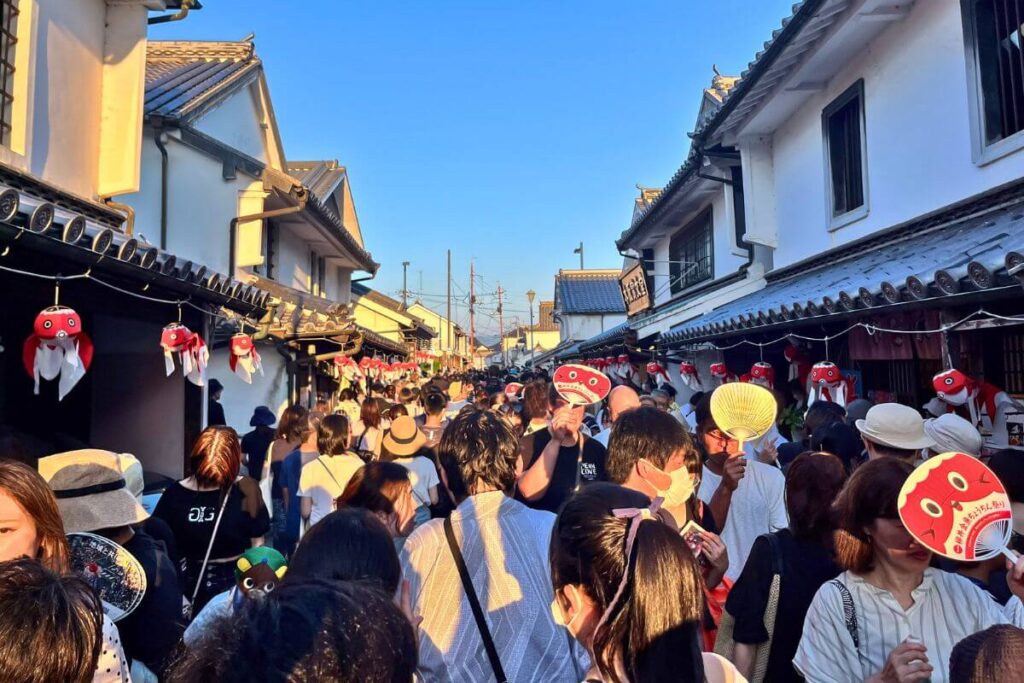
If you’re not a fan of crowds, then Japan may not be the best place for you to live.
According to the World Bank, Japan’s total population was approximately 125.50 million in 2022. And of that it is estimated that about 92% of the population lived in urban areas.
Given this, it should come as no surprise to hear that Japanese cities are crowded. Factor in tourism on top of that, and you’ve got incredibly congested metropolitan areas that are overwhelmed with people and crowds.
Tokyo is, unsurprisingly, the most populated city, but other heavily occupied areas include Yokohama, Osaka, Nagoya, and Sapporo.
Of course, on the flip side of this, Japan’s countryside is sparsely populated and offers a much quieter and more peaceful way of life. While job opportunities here will be limited, if you prefer to avoid the crowds and have the flexibility to do so, it may be worth it to venture outside the city.
Complicated Rental Process
One of the most difficult challenges you’ll have to overcome when moving to Japan is finding a place to live. The rental process here is very different from the Western world and can be complicated at times, especially for foreigners.
Before you can even begin to look at apartments, you’ll need to have a residence card, a local Japanese phone number, and the assistance of a designated real estate agent. This means it’s virtually impossible to secure housing ahead of time and is, instead, something that will have to be done once you’ve relocated to Japan.
In addition, many apartments and real estate agents are hesitant to work with or rent to foreigners, given the language barriers involved. Of course, if you speak Japanese, this helps immensely and will provide you with more options.
Finally, initial deposit fees can be quite high and, in some cases, can cost as much as six times the monthly rent – which can be shocking if you’re not prepared for it.
Given these challenges, some companies and programs now offer housing assistance for foreign employees. This assistance can come in many forms but typically involves rent subsidies, company-rented housing, or employee dormitories.
Time Zone Differences
The time difference between Japan and the United States is tough. Depending upon daylight savings, Japan is anywhere from 13 to 17 hours ahead of mainland US.
This makes it very difficult to keep in touch with friends and family members back home. And can be especially challenging if you need to speak with businesses or companies that run on US time.
In many cases, you’ll either need to make phone calls early in the morning or late at night. Which isn’t ideal but is certainly doable.
From my experience, friends and family members are usually pretty accommodating of the time difference, so coordinating phone calls isn’t too difficult. You just need to plan ahead and be mindful of each other’s schedules.
Frequently Asked Questions About Living in Japan As a Foreigner
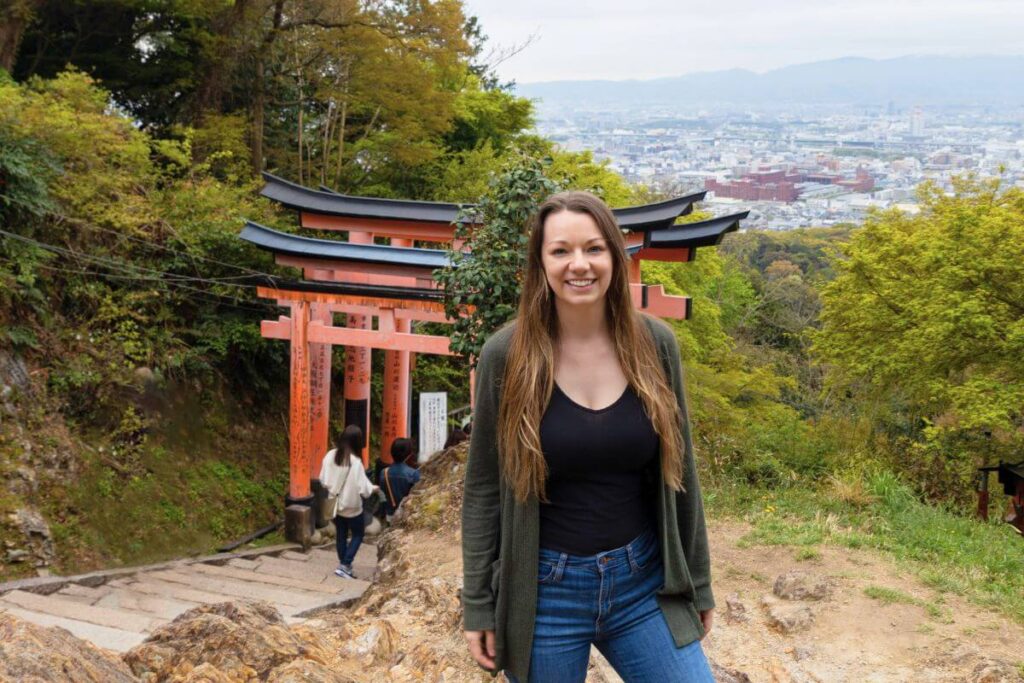
Fushimi Inari Taisha Shrine overlooking the city of Kyoto.
Here are my thoughts on some commonly asked questions about living in Japan.
What Is It Like to Live in Japan as an American?
Living in Japan as an American is an incredible experience that offers the opportunity to immerse yourself in a vibrant and authentic culture. While there will be challenges along the way, the advantages of moving to Japan far outweigh any difficulties you may face. After all, Japan offers a high standard of living, one that includes low rates of crime, abundant employment opportunities, efficient public transportation, affordable health care, and a truly welcoming and friendly atmosphere.
What Is the Quality of Life Like in Japan?
The quality of life in Japan is quite good. According to the OECD Better Life Index, Japan is above average when it comes to education, safety, environmental quality, and employment rates. In addition, Japan has one of the highest life expectancies in the world, with a rate that is 3 years higher than the global average.
Is It Difficult to Move to Japan?
It’s not particularly difficult to move to Japan, as long as you know how to move to Japan. As with many foreign countries, there are a number of steps involved in order to legally obtain residency. These steps will vary depending on the type of visa you apply for and your reason for moving (school, work, internship, etc.). Regardless of your circumstances, however, as long as you follow the correct administrative procedures and get all your paperwork in order, you should be good to go.
Is It Expensive to Live in Japan?
In my opinion, it’s not that expensive to live in Japan. On average, the cost of living is much cheaper here than what you’ll find in much of the Western world. Of course, larger cities such as Tokyo and Osaka come with higher price tags, but generally speaking, everyday living expenses are much more affordable.
Is It Safe to Live in Japan as a Foreigner?
Yes, it is definitely safe to live in Japan as a foreigner. Japan is one of the safest countries in the world and experiences very low levels of crime. In fact, Japan was rated as the 9th most peaceful and safest country in the world by the Global Peace Index.
Where Are the Best Places to Live in Japan?
There are a lot of great places to live in Japan as a foreigner. Some of the most popular include Tokyo, Osaka, Kyoto, Yokohama, Okinawa, and Nagoya. That being said, foreigners live all over the country, so you can go anywhere you want to. It really just depends on your personal preferences and job requirements, if you have any.
Final Thoughts: Is Japan a Good Place to Live?
There are so many reasons to live in Japan, and in my opinion, the pros definitely outweigh the cons. From the vibrant culture to the delectable food, the beautiful natural scenery, the endless travel opportunities, and the incredibly friendly communities, Japan truly has a lot to offer.
Of course, if we’re talking about practicality and standard of living, we also need to take into consideration all the perks that Japan provides. This includes low rates of crime, affordable health care, abundant job opportunities, a clean environment, and efficient public transportation.
Given all of this, I think it’s clear that Japan is most definitely a good place to live (but I’m certainly biased in my opinion)!
Have you ever lived in Japan? What do you think? Is Japan a good place to live? Let me know in the comments below!
Love this post about the pros and cons of living in Japan? Pin it now for later!
